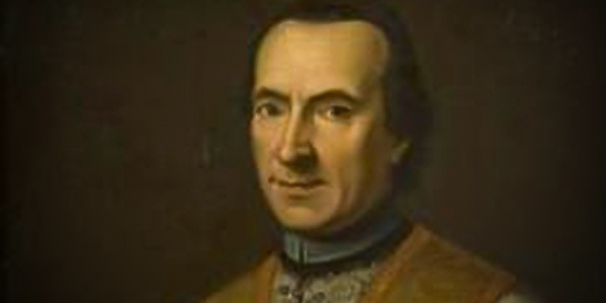John Baptist de Rossi was born on February 22, 1698, in Genoa. His mother and father were quite poor in material goods but were rich in virtue and love of neighbor. John was the youngest of four children, and even during his formative years, he not only exhibited obvious compassion and love for people but also had an above average intelligence. When he was 10 years old, his parents allowed him to leave home with close friends of the family to pursue his education
Three years later, John’s father died. His older cousin, Lorenzo de Rossi, allowed John to come to live with him in Rome. Lorenzo was the canon at St. Mary’s in Cosmedin and was able to get his nephew admitted to the Collegium Romanum under the guidance of the Jesuits. John quickly became a model student studying diligently and performing his required duties. At the same time, he was always pious and humble.
The young man also began studying philosophy and theology at the Dominican College of St. Thomas. It was during this time that, while at Mass, John passed out. It was discovered that he had an epileptic seizure. The illness caused him to miss many classes, and sometimes, fatigue was so pronounced he could barely move. For the rest of his life, dealing with this affliction would be a constant challenge for him.
Even so, while in school, he became a member of the Sodality of the Blessed Virgin and led the members in the readings and organized visits to the sick in hospitals, feeding the poor and the homeless, and performing other works of mercy. This was what John Rossi loved most of all: helping the poor, homeless, and downtrodden.
John Baptist de Rossi desperately wanted to become a priest, but his epilepsy was a huge obstacle. Ordination to the priesthood was rarely granted to someone in John’s condition. After all, the life of a priest was incredibly demanding and time-consuming. But he worked so hard and studied so diligently that he was given a dispensation. On March 8, 1721, John Baptist de Rossi was ordained a priest.
As a priest, he worked in Rome, caring for the homeless who wandered the streets of the city. He tended to the needs of the sick and assisted in helping find a hospice for homeless women. He aided prisoners, helped workers, and literally touched thousands of needy people—the sick, the homeless, prostitutes, transient cattle drivers who came to market in Rome, and other rough sorts. By day he devoted himself to the sick poor in Rome’s hospitals. By night he ministered to street people at a refuge. He did this for more than 40 years.
In 1738, Father John became very sick with an unknown illness. He was sent to a place called Civita Castellana, a day’s journey from Rome. The bishop there insisted that he hear confessions. John had done his best to avoid hearing confessions. He had a deep-seated fear that he might have a seizure and wanted to avoid that happening while in a confessional. The bishop, knowing of his knowledge and morality, insisted. In fact, the bishop gave him permission to hear confession in any church in Rome.
Father John Rossi began hearing confessions every day, mostly from the poor in the hospitals and on the streets. Before long he was preaching in churches, chapels, convents, hospitals, barracks, and prisons. He became known as the Apostle of the Abandoned and was called the second St. Philip Neri.
Sometime in 1763, paralysis began to slowly attack Father John. Finally, all his hard labor while fighting epilepsy caught up to him. He died on May 23, 1764.
Father John was buried at the Church of Trinita de Pellegrini under the altar of the Blessed Virgin Mary. Miracles followed his passing, but because of political upheaval in Europe, beatification was put on hold. Finally, on May 13, 1860, Pope Pius IX beatified Father John. On December 8, the Feast of the Immaculate Conception, Pope Leo XIII canonized Father John Baptist de Rossini.
One final note: Caregivers can look to John Baptist as a model. Before he would speak to a dying person about salvation, he did all he could to relieve their suffering. No service for the sick, no matter how deadly or repulsive their condition, deterred him from offering assistance and consolation to them.
Saint John Baptist de Rossi, please pray for us.

Read more:
The surprising hidden benefit of caregiving

